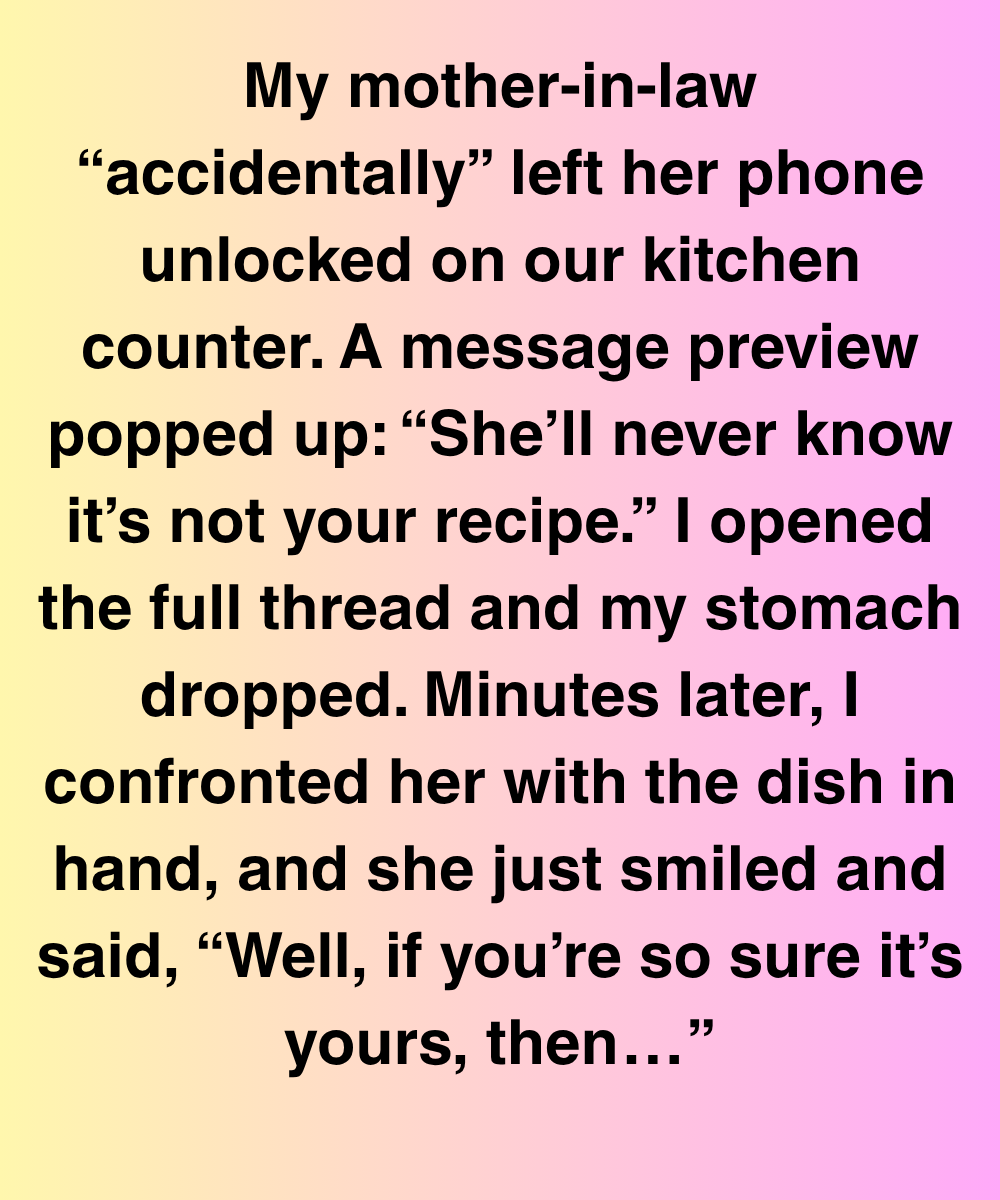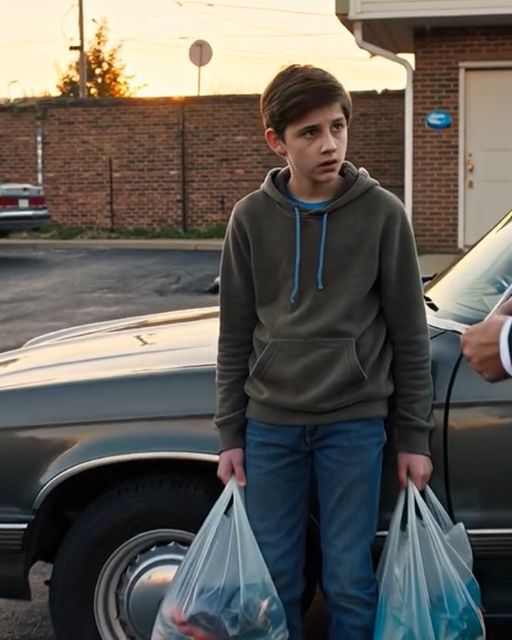My mother-in-law “accidentally” left her phone unlocked on our kitchen counter. A message preview popped up: “She’ll never know it’s not your recipe.” I opened the full thread and my stomach dropped. Minutes later, I confronted her with the dish in hand, and she just smiled and said, “Well, if you’re so sure it’s yours, then…”
I just stared at her. She picked up the fork and took a bite like nothing had happened. Calm as ever. The woman has always been a little… polished. Lipstick by 8 a.m., ironed napkins, passive-aggressive compliments like it’s her native language.
“Why would you do this?” I asked, trying not to let my voice shake.
She dabbed the corners of her mouth with a cloth napkin. “It’s a shared kitchen, Noelle. Recipes evolve.”
Except it wasn’t shared. That Moroccan-inspired carrot and orange blossom salad was mine. Completely mine. I came up with it two summers ago, after traveling to Fes with my sister, Lianne. I’d tested it twelve different ways, written it up, even sent it to a small food blog under my name.
Now, suddenly, it was “hers”—and being entered in the “Homegrown Heritage” contest hosted by a regional food magazine, with the grand prize being a trip to Paris and a photo feature in the fall issue.
I’d overheard her mention the contest to her church group last week. She said she wanted to “honor the flavors of her childhood.” My eyebrows raised back then, but I figured she was just romanticizing her past again. She grew up in Iowa.
I confronted her gently. I really did.
“Why not enter your own recipe, Fatima?” I asked her. “Why this one?”
She set down the fork and looked me dead in the eye. “Because it’s a winning dish. And no one asked you to sit on it for two years.”
That stung. Because she wasn’t entirely wrong. I had sat on it. I’d shared it at a few potlucks, even once at a catering gig I helped out with, but I never took it to the next level. I kept telling myself there’d be time.
So yeah, her move was shady. But also smart. And that made me even angrier.
I told my husband—her son, Karim—later that night.
He rubbed his temples and said, “Can’t you two just talk it out? Maybe share the credit?”
“Share the credit?” I said. “She submitted it under her name. It’s already been published on the contest website. She even changed the garnish to microgreens so it’d look more ‘elevated’ in photos.”
Karim sighed. “Look, I know my mom can be… ambitious. But this is just a recipe.”
I stared at him. “No. It’s not just a recipe. It’s a part of me. A piece of a trip that changed my life. And she just hijacked it like it’s some Pinterest pin she tweaked.”
He didn’t get it. And honestly, I didn’t expect him to. His mom has always had a tight grip on how things should look. And that includes who gets to shine in this family.
For the next few days, I stewed. I thought about calling the magazine. Thought about blasting her on social media. But I didn’t. Partly because I didn’t want to cause a scene, and partly because I wanted to see what she’d do when the finals came around.
The contest had a live cook-off component. Finalists had to recreate their dish in front of a small judging panel and audience.
Fatima practiced at home, of course. She even had the nerve to ask me where I got “those really juicy blood oranges” because “hers weren’t quite the same.” I wanted to laugh. Or scream. Instead, I handed her the name of my grocer with a fake smile.
The day of the cook-off arrived. It was held in the event space of a trendy hotel downtown. I didn’t tell her I was coming, but I showed up early with my sister Lianne.
We sat in the back, half-hidden behind a column, watching Fatima set up her station in a crisp white apron embroidered with her name. She looked proud. Confident. Like the queen of her own story.
As she cooked, the judges wandered, asking questions. When they asked about the inspiration behind her dish, she launched into this sweeping monologue about her grandmother in Tangier.
“Wait,” Lianne whispered to me. “Didn’t she grow up in Des Moines?”
“Yep,” I muttered. “Not even a passport stamp to her name.”
The judges seemed charmed. They nodded, scribbled notes. She plated the dish with those same damn microgreens and passed it forward with a flourish.
I didn’t know what I was going to do. I had no plan.
But then one of the judges—a tall woman with short grey curls—held up a printout of a recipe blog post. She turned to Fatima and said, “I found a version of this dish online. Almost identical. Posted by someone named Noelle Amina.”
My heart leapt into my throat.
Fatima blinked. “Hmm. That’s a coincidence,” she said, voice steady.
“But the name. That’s your daughter-in-law, yes?” the judge asked.
She smiled. “Yes, but my version has a very different story.”
Lianne looked at me. “She’s doubling down.”
The judging paused. A hush fell. And something in me cracked open.
I stood. Walked down the aisle, my heart thudding. Everyone turned to look. Including Fatima.
“I’m sorry to interrupt,” I said, voice clear. “But that recipe—that exact recipe—is mine.”
Gasps. Awkward shuffles. A photographer raised his camera instinctively.
“She took it from me,” I said. “Without permission. I created it two years ago after a trip to Morocco. I’ve made it dozens of times. It’s on my blog. I can show timestamps, test notes, photos. Everything.”
Fatima turned pale. She opened her mouth, then closed it.
One of the judges stepped forward. “Would you be willing to make it now? From scratch? You can use what’s here.”
I nodded.
Someone brought me an apron. Fatima stepped aside, silent.
I cooked like my hands had something to prove. I sliced, juiced, zested, whisked. Lianne stood nearby, steadying me with her presence.
When I plated the dish, I didn’t add microgreens. I used fresh mint and toasted sesame—just like I always had. I handed it over.
The judges tasted. And one by one, they smiled.
“This version sings,” one said. “It’s layered. Real.”
Another nodded. “And the story matches the soul of the dish.”
Fatima still hadn’t moved. She stared at the table, jaw tight.
Later, I overheard her speaking with the organizers. She was disqualified. Quietly. They didn’t announce it over the mic, but she didn’t win. I did.
They awarded me the prize—the Paris trip, the photo feature, and a small cash bonus. I cried in the hotel lobby. Not just for the win. But because I’d stood up for myself. For the first time in a long time.
Karim called that night. He’d heard. I could tell he was torn.
“She told me she just wanted to feel like she had something of her own,” he said. “She said everything in her life is about other people now.”
I let that sit.
“I get that,” I replied. “But it doesn’t justify stealing.”
He sighed. “She’s humiliated. Doesn’t know how to face you.”
“Maybe that’s not my job to fix.”
There was a pause. Then he said, “I’m proud of you.”
A week later, Fatima showed up at our door. No announcement. Just a brown bag of lemons and a small, hand-written card.
“I’m sorry,” it read. “I forgot what it feels like to make something from the heart. Thank you for reminding me.”
She didn’t come in. Just left the bag and walked back to her car.
I watched her drive away, heart softening just a little.
Now, months later, the Paris trip is booked. I’m going with Lianne. We’ve already mapped out every patisserie within walking distance of our Airbnb.
And my recipe? It’s getting published next month. Full credit. Full story.
Sometimes, people will try to take shortcuts through your life. Wear your work like it’s theirs. But the truth? You can’t fake flavor. Not the real kind.
So here’s what I learned: protect your work, but more than that—believe in it. Stand up even if your voice shakes. Sometimes, the only way to keep your seat at the table is to flip it over first.
If this resonated with you, give it a like or share—it might help someone else stand their ground too.




